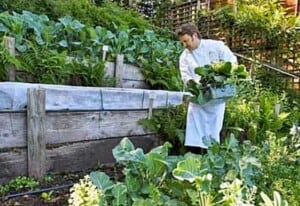We often talk about the fact that successful gardening, especially successful organic gardening, requires healthy soil. But how do you know if your soil is healthy? Adding lots of organic material helps assure that your soil is alive with microbes, maintains a balance of nutrients, and has good drainage. But what about its acid-alkaline balance (the measurement known as pH)? What about the nutrients that plants need to be healthy and resist pests and diseases?
Testing soil — especially new garden soil — helps guarantee your vegetables and other plants will do their best during the growing season. And springtime, just before you begin planting, is the best time to do it.
Home kits are not only effective but make soil testing easy. You can now easily measure your soil’s pH reading with digital pH meters or use the old color charts that were for years the tried and true means of pH measurement for home gardeners.

FAST RESULTS!
Soil Test Kit
You'll appreciate this easy, fast and fun way to achieve better growing results.
$17.95Learn moreIf you’re looking for the fastest ticket to a lush garden, start at ground level. Planet Natural offers a large selection of soil test kits to help you grow healthy, productive plants year after year.
You don’t need to understand soil pH and its importance to your plants in any great detail. pH, the measure of how acidic or alkaline a soil, is measured on a scale of 1 to 14 with 7 being neutral. Most vegetables grow well in a pH range of 6.5 to just above 7.0 though some, including corn, carrots, cucumbers and tomatoes will tolerate soil pH down to 5.5. Potatoes prefer acidic soils and grow best in a range of 6.0 to 5.o. Providing the proper soil pH for your plants is all about nutrition uptake. Your plants can’t get the proper nutrients they need if those nutrients are unavailable because of improper pH conditions.
For a chart on the pH ranges favored by common vegetables, go here. A more complete list that includes trees, shrubs and ornamentals is here. Notice that the particular range for different vegetables can vary, with some charts giving wider ranges, some giving narrower ranges. A reading between 6.5 and 7.0 will generally satisfy almost any vegetable you plant, except for eggplants, melons, and, again, potatoes.
Correcting any pH deficiencies can take some time and work. Lime is traditionally used to make soil less acid, sulfur less alkaline. For detailed instructions go here, and here. More good information on measuring and correcting soil pH is here.
It’s also important to test for the big three in plant nutrition: nitrogen (N), phosphorous (P) and potassium (K). Again there are home kits available as well as electronic meters that will give you a good idea of any deficiencies you may need to correct. Start here to reinvigorate your soil with the macronutrients your garden may need.
There are other nutrients in soil, the micronutrients, that are also important to growing the kind of plants that will give strong yields while resisting pests and diseases. Most home garden kits don’t measure for these components. But your local University extension service might be able to help. They may provide the most accurate and detailed soil analysis available and if you live in a state whose universities offer the service, take advantage. If an extension service is not readily available or your state university no longer offers the service, you can use a private service.
Correcting nutrient deficiencies is a big topic. But the first step is to discover them. Start your springtime planting activities by checking your soil. You’ll be glad, come harvest time, that you did.











